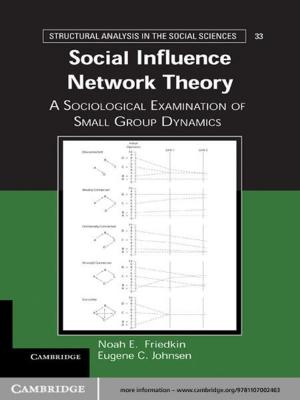Diplomacy Meets Migration
US Relations with Cuba during the Cold War
Nonfiction, Social & Cultural Studies, Political Science, Politics, History & Theory, Social Science, History| Author: | Hideaki Kami | ISBN: | 9781108530293 |
| Publisher: | Cambridge University Press | Publication: | June 30, 2018 |
| Imprint: | Cambridge University Press | Language: | English |
| Author: | Hideaki Kami |
| ISBN: | 9781108530293 |
| Publisher: | Cambridge University Press |
| Publication: | June 30, 2018 |
| Imprint: | Cambridge University Press |
| Language: | English |
Diplomacy Meets Migration examines diplomacy, migration, and the history of US relations with Cuba during the Cold War. Hideaki Kami draws on declassified US and Cuban diplomatic sources, as well as Miami-Cuban lobby records, to challenge traditional interpretations that mainly focus on the two national capitals, Washington and Havana. By incorporating Miami into the story of foreign affairs, Kami assesses the intersection between migration and diplomacy, and considers how migration emerged as a critical issue that shaped the dynamism of US relations with Cuba. Kami demonstrates that the US government reformulated its Cuban policy in response to Fidel Castro's institutionalization of power, while simultaneously trying to build a new relationship with the Miami Cuban community, a new, politically mobilized constituency within US society. He shows how both migration control and migrant politics became important components of US foreign policy, which in turn influenced Cuban policy toward the United States.
Diplomacy Meets Migration examines diplomacy, migration, and the history of US relations with Cuba during the Cold War. Hideaki Kami draws on declassified US and Cuban diplomatic sources, as well as Miami-Cuban lobby records, to challenge traditional interpretations that mainly focus on the two national capitals, Washington and Havana. By incorporating Miami into the story of foreign affairs, Kami assesses the intersection between migration and diplomacy, and considers how migration emerged as a critical issue that shaped the dynamism of US relations with Cuba. Kami demonstrates that the US government reformulated its Cuban policy in response to Fidel Castro's institutionalization of power, while simultaneously trying to build a new relationship with the Miami Cuban community, a new, politically mobilized constituency within US society. He shows how both migration control and migrant politics became important components of US foreign policy, which in turn influenced Cuban policy toward the United States.















